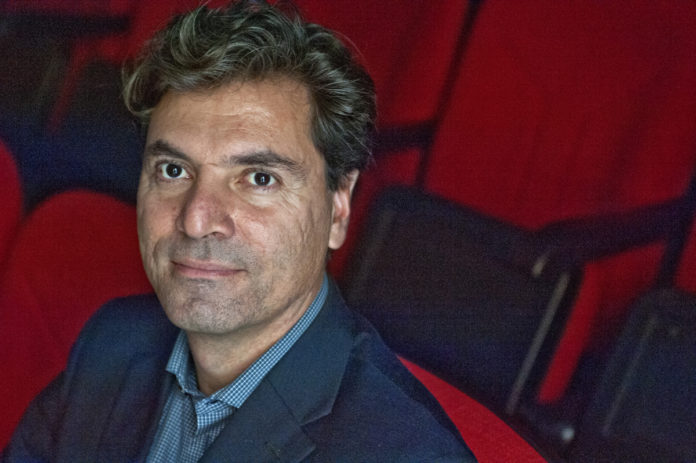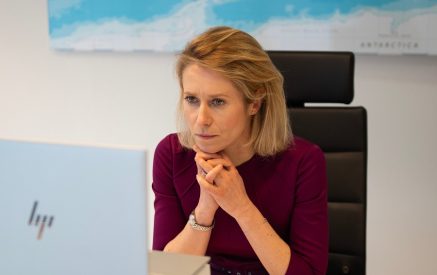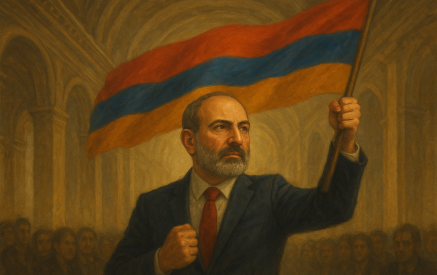by Harry Kezelian
BELMONT, Mass. — On Thursday, March 31, the National Association for Armenian Studies and Research (NAASR) held a virtual panel discussion titled “The Ukraine War and Armenia(ns): Immediate Impacts and Repercussions.”
Dr. Vicken Cheterian (History/International Relations, University of Geneva), Dr. Nerses Kopalyan (Political Science, University of Nevada – Las Vegas), and Dr. Anna Ohanyan (Political Science/International Relations, Stonehill College), served as panelists discussing the impact that the war in Ukraine is having on the Armenian world.
Read also
Introduced by NAASR director Marc Mamigonian, the panel was moderated by community activist and member of the NAASR Board of Directors, Stepan Piligian.
First to speak was Cheterian, who opened with the comment that “the Russian invasion has been full of surprises.” One surprise, at least in the minds of many in the West, was that Putin would actually make good on his threats to invade Ukraine. The assumption by key analysts and foreign policy advisers was Putin was bluffing to obtain concessions, said Cheterian, crediting President Biden as one of the few who actually took Putin at his word.
The second surprise, he said, was that while Putin has been “very meticulous” and “a strong technician” in the past who understood “the balance of forces,” the Putin who is invading Ukraine is a different man; ideological and bitter. Cheterian also noted that the Russian military performance in Ukraine has been subpar.
The Russians themselves were in for another surprise, said Cheterian; he claims they didn’t expect such a strong show of unity between the US and Europe in support of Ukraine.
The result of this invasion, Cheterian said, is a new phase of strong polarization in Europe. While prior to the war, there had been some voices in Western Europe supporting Putin — both among right-wing populist groups and some intellectuals — today, such viewpoints have been marginalized, he explained.
Looking at Turkey, the war did not bring a very dramatic change, Cheterian stated. Turkish policy is the same; they are maintaining their balancing act between a rejuvenated NATO and Russia. Turkey tries to portray itself as a mediator. But while they make declarations against the invasion, they continue to do business with Russia and have imposed sanctions. Azerbaijan is also playing a balancing act, said Cheterian.
Therefore, said Cheterian, it seems that countries in the Middle East and elsewhere are not getting caught up in the polarization between the West and Russia, but looking out for their own interests while attempting a balancing act; and this includes Turkey, Azerbaijan, and — surprisingly, according to Cheterian — Georgia, which did not take “harsh” actions against Russia.
Next to speak was Kopalyan, whose work focuses on World Political Systems. Kopalyan agreed that the failure of Russia’s total invasion had taken Putin by surprise and that he was seemingly retreating while absorbing the Donbas region in the west.
Kopalyan noted that the cleavage between the West and Russia places Armenia “in an almost impossible position,” and that the situation “puts enormous pressure on their ability to not fall into the trap of choosing sides.”
Instead, Armenia is engaging in what’s known in political science literature as “strategic shirking.” Kopalyan differentiated this from “strategic silence.” Armenia has not been silent; rather they have made it known that they will refrain from any entanglements, despite various attempts by Azerbaijan, Turkey, and even Ukraine to pull the country into the conflict.
“Strategic shirking,” said Kopalyan, is precisely the position that Russia assumed (at a lower risk level to them) during the 2020 Karabakh War, at least until its conclusion. Russia was not silent — they spoke about the Karabakh conflict being decided in other platforms, they engaged in vague rhetoric, and they discussed reconciliation. But they engaged in “shirking;” as Kopalyan and avoided direct involvement in the conflict.
Neutrality is extraordinarily difficult, said Kopalyan. Thus, Armenia takes a pragmatic, but vague posture; they discuss reconciliation without getting involved in the actual conflict.
What has become obvious, said Kopalyan, is that Russia’s takeover of Eastern Ukraine will place Armenia in a difficult position vis-a-vis international platforms. Azerbaijan will try to use this to frame Armenia as a pro-Russian pariah and try to pain it with guilt by association. Meanwhile, Russia may actually try to force Armenia to recognize the independence of the Donetsk Republic (the ethnic Russian breakaway state in Western Ukraine), which Armenia will not want to do, to avoid becoming a pariah to the West. Russia may also propose that the breakaway regions of Ukraine become member states of the Commonwealth of Independent States (CIS) and other Russian-led international groups.
Due to these factors, and with the intensification of the rift between the West and Russia, the avoidance of entanglement becomes exceedingly difficult, said Kopalyan. Diplomatic pressure from the West will increase, and the European Union (EU) will become less tolerant of Armenia’s siding with Russia in European forums. This has already been happening as the EU has put pressure on Armenia for siding with Russia in the Council of Europe. Meanwhile, Russia will continue to pressure Armenia to take their side. This won’t happen only to Armenia, but all countries that Russia considers a part of its sphere of influence. From a diplomatic perspective, therefore, the biggest impact of the war is a greater concern over diplomatic polarization.
Kopalyan also discussed the issue of security in Armenia and Artsakh. He and other analysts, using projection modeling, said they expect a broader incursion by Azerbaijan in April. According to the analysts, Azerbaijan appears to be preparing for a new assault, exhibiting behaviors consonant with readiness for such an action.
This behavior of Azerbaijan, Kopalyan said, could be attributed to two factors. One is the weakening of Russian power. The war in Ukraine appears to have the effect of weakening Russia, at least in relative terms, more than strengthening it.
Secondly, again due to the war, Russia’s military resources are being depleted. Since Armenia buys 90 percent of its arms from Russia, this could limit Armenia’s ability to buy arms and maintain military preparedness, he said. Kopalyan suggested that negotiating with France, India, and China could be a way for Armenia to increase its military hardware.
Ohanyan drew attention to various changes that are taking place in world politics, some of which actually preceded the war, but were exacerbated by it. Some of these include, great power rivalry, multipolarity (within which Russia has sabotaged its own role), the weakening of the international rules-based rule order (which softens the idea of “territorial integrity” that is key in the Karabakh conflict), and militarization and coercive diplomacy as a negotiation strategy. The fragmentation of the global economy, due to Covid especially, is another major issue.
Ohanyan noted that the West’s response to the Ukraine crisis amounts to an economic containment of Russia, an unprecedented attempt to excise Russia from the global economy. The economic fallout for Armenia is hugely significant, she said, adding that the volatility of world politics is going to be the new norm, and not only Armenia but many other developing countries.
With the Ukraine war, Ohanyan stated, Russia abrogated its institutionalized engagement with China to bring about Eurasian integration and connectivity. Such connectivity is in China’s interest and is a part of their agenda; Armenia’s previous foreign policy choices made sense in this context. But now that Russia is globally isolated, it has become unreliable in advancing such Eurasian integration. This dictates a rethink of Armenia’s security infrastructure but also its development in general.
Ohanyan noted that it was too early to predict just what sort of Russia would emerge from the war, whether vindictive or remorseful. Ohanyan noted that Russian media and messages issuing from the Kremlin are already talking about the need to encourage business, which has been affected by the sanctions. The “social contract” between Putin and his people is threatened if there is an economic downturn, and so Russia may try to connect with the global economy through post-Soviet periphery countries like Armenia, she added.
Ohanyan seems to think that “the West is not going to emerge victorious” despite the strong show of unity against Russia, and that there will be a host of problems such as food crises in developing countries, global recession, and electoral backlash in Western countries because of the rise in the price of gas. She also noted that several traditional Western allies such as India, Israel, Turkey and the Gulf States are on the fence in regard to the war.
One change now, she explained is that Russia is becoming more authoritarian and power is becoming more centralized, meaning the state’s institutional capacity to navigate their way out of the crisis has lessened. This is particularly true considering that green energy looks ready to overtake oil in the next 20 years, and oil rich economies like Russia are under pressure to modernize.
Looking at whether a “new cold war” would emerge and how Armenia would be impacted, Ohanyan mentioned the economic impact, labor migration, remittances, and food security, in addition to the fact that with the sanctions placed on the Russian commodities market, transportation corridors through Armenia may become an option for Moscow. Conversely, some financial analysts are even arguing that the South Caucasus is emerging as an alternative route from China to Europe.
Ohanyan noted that though Russia is a pariah for now, ultimately the West will still need Russia to solve major issues like the standoffs with North Korea and Iran, as well as the climate change crisis; and the Nagorno Karabakh issue might be an opportunity for Russia and the West to come together in a conflict resolution project.
Ohanyan concluded that “Armenia is on track with deepening its state capacities as long as those states that derive legitimacy from the public are better positioned to push back against the polarization” which derives from world politics and the “new cold war” which most developing countries do not want.
During the question-and-answer period, Cheterian opined that Armenia is entering period of instability. Cheterian argued that since the late 1990s, the country has relied too much on Russia, and has not invested enough in solving its problems, such as the Karabakh issue or relations with Turkey. A weakened Russia helps Armenia, he continued, pointing out that whenever Russia is powerful, the more neutral it becomes, and the more it views Armenia as a pawn to advance its own interests, but when Russia is relatively weak, it acts in a more pro-Armenia manner, more like an “older brother.”
In response to another question on diplomatic ties between Armenia and Russia, Ohanyan stated she doesn’t think any county can rely on any single country for security and that Armenia needs to diversify its diplomatic presence. Armenia-Turkey diplomacy, she said, needs to be looked at with great care because it links Armenia to European markets. Security is a multilevel product, she added. That which needs to be done for the security of Artsakh is one thing; the broader security of Armenia as a whole, however, depends in Ohanyan’s mind on Armenia’s joining international organizations.
Cheterian agreed that Armenia needs to look to other partners to diversify their security, naming France, Greece, China, and India as possibilities. He also pointed out that Azerbaijan manages to diversify its security (i.e., close relations with both Russia and Turkey), so why can’t Armenia depend not only on Russia but also other countries for its security.
To questions about the continued efficacy of the Organization for Security and Cooperation in Europe (OSCE) Minsk Group tasked with solving the impasse of Karabakh, Ohanyan mentioned that the outcome of the 44-day war was “illegal and coercive,” and that the placement of the Russian peacekeepers was also not a part of the Minsk Group format. Therefore, both Azerbaijan and Russia ignored the peace process. Ohanyan called the West’s ignoring of the war, “a canary in a coal mine,” showing the failures of the Western project to advance democracy. She argued that although the West professes to be spreading democracy, they seem to think it should be a top-down process, a sort of geopolitical game, and they are more concerned with siding with whoever is in NATO rather than encouraging democratic processes like the Minsk Group, which, if implemented, actually would help spread democracy.
Kopalyan stated that the issue with Minsk Group is that Azerbaijan has a “schizophrenic” posture toward it. On the one hand they deny the relevance of the Minsk Group and say that the issue has “been resolved.” On the other hand, they do participate in the negotiations. They are trying to change the mandate of the Minsk Group — they want to use it to help broker a broader Azerbaijan-Armenia treaty (which is not what it was created for) and lump Karabakh into that, he explained.
Cheterian reminded the audience that Ukraine has developed military cooperation with Turkey in the last few years and supported Azerbaijan. But he also pointed out the similarities between Armenia and Ukraine, both being “fragile countries struggling to move away from their Soviet totalitarian heritage and experiment with revolutions and democratization. Cheterian also noted that there is a longstanding Armenian diaspora community in Ukraine, including many migrants from present Armenia, who need our help and attention.
Kopalyan was more cynical regarding the Ukraine-Armenia connection, pointing out that Ukrainian leader Volodymyr Zelenskyy’s administration made a decision to prioritize Azerbaijan over Armenia, and views the occupation of Crimea, for instance, as similar to Armenia’s “occupation” of Artsakh. Azerbaijan has sided with Ukraine a parallel narrative about “territorial integrity” has been advanced by both sides. Furthermore, Zelenskyy has taken the attitude that “if you aren’t for Ukraine, you’re against us,” even recalling the ambassador to Georgia because that country didn’t sufficiently support Ukraine. The anti-Russian sentiment is so aggressive, and understandably so, said Kopalyan, that “guilt by association discourse is resonating more than what the reality is.”
Finally, the panelists agreed that the world responded differently to Artsakh than Ukraine, not only because Armenia and Azerbaijan are countries many don’t know, but because the world is primarily responding to the Ukraine invasion due to fear of Russia rather than any particular knowledge of Ukraine itself. Cheterian in particular, blamed the West for not making it clear that Ukraine would never be allowed into NATO or the EU. He states that Ukraine’s interest in joining the western alliances, and the West’s negligence to make it clear that this would be impossible, only angered Russia, yet when Russia invaded, the Western countries didn’t really protect Ukraine.
Kopalyan expressed the opinion that Ukraine “is being given up as a sacrificial lamb” by the West to get Russia in a Vietnam-like quagmire, which will weaken Russia. He also mentioned that Azerbaijan got some sympathetic ears in the West because they based their argument on territorial integrity, and claimed that when negotiations failed, they had to invade “their territory.”
Finally, Ohanyan stated that the war in Ukraine is “more anti-systemic” while the Karabakh conflict results from “the tyranny of territorial integrity,” bringing up the conflict in the Tigray region of Ethiopia as a similar case, and finally concluding that “as a human being it upsets me that we haven’t developed an anti-war movement.”


























































